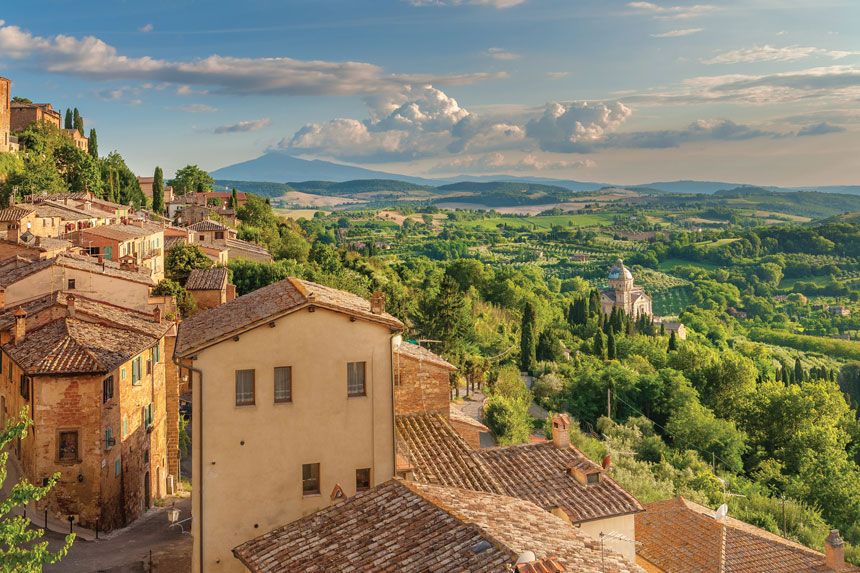The night before I bought an abandoned house in the Tuscan hills, I couldn’t sleep. For one thing, the church bells near the hotel rang not only the hour but sent out a few bonus clangs for quarter and half hours as well. I was about to get rope burn from churning on rough cotton sheets. It was summer in Cortona, the driest July in memory. Even the night couldn’t cool down stony streets torched all day by the fierce sun.
I sat up and wrote in my notebook, I am about to buy a house in a foreign country. Why have I gotten myself into this? Make a list! This is all I could come up with: It is so beautiful. The bells — four, five, six. And as we know from the poet John Donne, they toll for thee. Remembering that somber thought, I quickly scrawled in my notebook: Carpe diem! And Why not?
Though I still could have backed out, I made my way to the notary office the next day and listened to the endless contract read aloud in Italian. I didn’t understand one word. The agent handed me a huge iron key and that was that.
“Nothing ventured, nothing gained” always made sense to me. I’d gone off to college far from home, set out for California after that, made a university teaching career in poetry, left a solid marriage for the lure of big romance. I’ll take a risk. But I’d never taken a peculiar risk like this — plunking down my life savings on an abandoned house thousands of miles from home. I was single. No safety net. Everyone said I was insane to consider such a thing. “You’ll live to regret this,” a relative said. (Later, the relatives poured in for visits.)
No, I didn’t. “What luck,” I soon found myself writing. “What is this happiness that keeps coming in waves?”
Though never a major subject for philosophers, happiness preoccupies the rest of us all our lives. Hundreds of self-help books attempt to steer our thinking along positive paths. One advises: Keep an image journal, which seems like a good idea. On punishing diets, we’re offered a “happy meal.” Emails come to us decorated with the smiley face emoji and red hearts. Any time we’re photographed we are urged to smile so that our happiness at that moment is verified. The right to the pursuit of happiness even anchors the U.S. Declaration of Independence. But happiness is elusive, and the “pursuit” of it sounds desperate, as if you must stalk it. I associated happiness with moments of surging joy — falling in love, birth of a child, starting a new manuscript, the plane taking off for Peru. All big moments, with the rest of life proceeding along, powered by a tailwind, with stretches of turbulence.
The waves of happiness I began to experience in Italy, however, came from seeing how easily my neighbors went about their days, and from living close to the seasons in a place of beauty. The rhythms of life assumed a natural pace, not the frenetic one I was used to. Many changes came quickly, and I can’t sort out a quantitative cause and effect that catapulted me into a baseline happiness, but I came across a succinct quote from Aristotle: “Happiness belongs to the self-sufficient.” Taking a risk means you are in charge of yourself; it builds a foundation under your feet. You literally seize the day. In my novel Women in Sunlight, three women set on a predicted path break away and change their lives. In the story, each comes upon a private moment of change, and each seizes that moment. For Julia, it’s a leap off a cliff into the sea at Cinque Terre. I loved writing the scene because I gave her the feeling I always have when I have stepped up to an edge. At that moment, you own your life and the place you make for yourself.
I read one of my favorite Italian poets, Cesare Pavese: “The only joy in the world is to begin.” Beginning a new life in a foreign country, beginning a journey, beginning a relationship, yes, those are joys, but so are the smaller beginnings on the other side of risk that sustain you on any random Wednesday.
I slipped into several. I began to simplify. I learned to cook the Italian way and my kitchen transformed. I came to think that once or twice a week is the right number of times to have friends over for dinner. I began to love bright packets of seeds. We raise a lot of our vegetables — what a pleasure. I walk over Roman roads listening to audio books, simply lost for long treks. To begin a new language causes brilliant sparks in the brain and even changes your dreams.
I began to build a nature photo album and notebook, to capture in an image or paragraph a wild spotted orange lily or an autumn tree glowing with persimmons, or a cloud like a load of sheets from the dryer. This isn’t a book I’m writing, but a sort of meditation on the natural world. Without this habit, I would not have discovered the outlandish chartreuse-and-purple bellavedova (beautiful widow) iris growing on my hillside. My camera and pen keep me observant and connect me to stands of red poppies, tart wild plums, a field of heather, ethereal almond blossoms, and deadly poisonous mushrooms. The pleasure isn’t at all like that of posting on Instagram. It’s private and meditative.
I love beginning the day with a writer. I choose one for a whole month and give her each day a short, dedicated time of reading. I become an apprentice to a mind I admire. Recently, I’ve loved The Stories of Jane Gardam. Pages of play with language, subjects turned upside down and inside out, plus a quirky, rough sensibility that is often funny, risks the absurd without quite succumbing. She’s my exciting companion for now.
As I began these devotions, an ancillary benefit occurred. One morning at breakfast I realized I was ingesting with my cappuccino and toast bad news — terrorism, riots, floating corpses in the Mississippi River. As I started to notice all the violence and fear I took in every day, I became allergic to the toxic effects of news. In my notes I wrote: Subtract a little media every day. Not that I advocate a head-in-the-sand mentality. I read news three or so times a week. Politics and world events are frequently discussed with friends. Basta. Enough. The news is bad. I don’t want my daily bread with a dose of horror, especially when disaster strikes and is endlessly repeated, sometimes with relish. This reiteration simultaneously deadens you to the event and raises anxiety. Mayhem, murder, and monstrous acts give a sense of the world that is true but not all the truth. My friend Josephine said, “That’s the wound of the world. Don’t mistake the wound of the world with the world you know and love.”
Tune out, tune in. Unfollow those Facebook zealots who get on your nerves; even cat videos on Instagram are better. Vikingur Ólafsson on the piano or Joshua Bell on the violin or Yo-Yo Ma on the cello will justify the world every morning, raising your natural exhilaration and zest, rather than weighing the bloodstream with lead.
Acting on an irrational desire that arises from some deep place may be one of the best decisions you make in your life. For me, the strength behind taking a risk emanates from a gold locket I wore as a child. This locket opens to a picture of my mother, who did not have the chance to do many of the things that I do. As a decision approaches, I snap open the locket, which no longer actually exists. There’s her pretty face looking at me. Go, she whispers. Yes! Go!
In the study of the house I did not live to regret, I recently began writing a new book. The first line came to me. A line I think can take me to the end. At this desk I sit down to a plethora of words, images, story. Through the window open to a view of hills, I hear the deep gongs of bells over Cortona marking time, what luck, that Italian time. The notebook page smoothed down, the pen poised over the page, always the risk: the first words written.
Frances Mayes is the author of Under the Tuscan Sun, Bella Tuscany, Every Day in Tuscany, A Year in the World, and three illustrated books. She is also the author of two novels, Swan and Women in Sunlight, and has written six books of poetry and The Discovery of Poetry.
From the book A Place in the World: Finding the Meaning of Home by Frances Mayes. Copyright ©2022 by Frances Mayes. Published in the United States by Crown, an Imprint of Random House, A division of Penguin Random House LLC
This article is featured in the March/April 2024 issue of The Saturday Evening Post. Subscribe to the magazine for more art, inspiring stories, fiction, humor, and features from our archives.
Become a Saturday Evening Post member and enjoy unlimited access. Subscribe now



